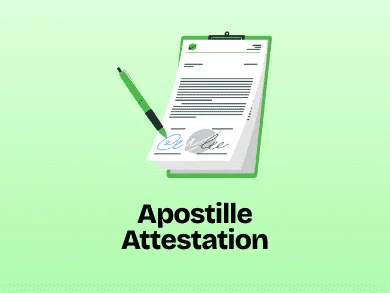



If you are looking for a visa for planning a long-term stay, it could be for higher education, employment, or temporary or permanent residency, then you must hear about apostille. This is because document legalisation is a mandatory procedure to be followed. The main purpose of certificate apostille and document apostille is typically the legalisation of the submitted documents and certificates. However, there are different stages of verification and validation before final legalisation by the central government. With the proper guidelines from our experienced team, you can learn everything about the entire process of apostille attestation, its cost, and the time it takes in India to be done.
Apostille is a form of foreign paperwork primarily used by countries that have signed the Hague Convention. Apostille attestation is a way of verifying legal documents, typically to prevent unauthorised foreign documents from being used by individuals seeking to study or work in Hague Convention countries. The Apostille attestation format is accepted in more than 116 countries, primarily in Europe and the Americas. In India, a Ministry of External Affairs sticker is affixed to the document, and a stamp is applied in such a way that it partially covers the sticker and partially the document.
The Hague Convention developed a universal legalisation system to safeguard the use of foreign public documents in the 1961 Hague Convention Treaty. Approximately 92 countries that are signatories to the Hague Convention employ the apostille to verify the authenticity of documents. Apostille authentication has become a mandatory procedure for immigration into a Hague Convention country. The word 'Apostille' is derived from the French language and signifies the true significance of the term 'Apostille.'
The 3 primary types of apostilles are listed below:In India, the MEA department is responsible for the duty of providing apostille stamping, which is to validate the document's authenticity with the apostille stamp. The stamp will stick to the back of the document. Apostille approval is mandatory for every outsider to obtain an apostille before moving to any Hague Convention country.
In India, the Apostille practice has lately been privatised by the national government. The Ministry of External Affairs (MEA) is the central organisation in charge of document apostille. Since January 1st, 2019, the MEA has localised the apostille procedure for Branch Secretariats and RPOs in 15 locations. Ahmedabad, Bengaluru, Bhopal, Chennai, Chandigarh, Cochin, New Delhi, Guwahati, Hyderabad, Kolkata, Lucknow, Mumbai, Panaji, Raipur, and Thiruvananthapuram are among the places where the company operates. In general, it starts with the municipal notary where the document was issued, then the state verification, and finally the MEA apostille sticker.
The three main types of Apostilles are listed below:
In India, the MEA department is in charge of giving the Apostille stamp, which validates the document and is attached to the reverse. Extra confirmation may only be required in particular instances if a document has acquired an Apostille. In the current global atmosphere, any outsider should obtain an apostille before travelling to any country that is a signatory to the Hague Convention.
SDM and Apostille are the two mandatory steps required for this approach. Immigrants can meet the personal and professional needs of the target country by following this method. The fundamental purpose of apostille verification is to preserve the original certificate from illegal endorsements. The attestation approach is used by countries that are not Hague Show members.
Some of the common processes required for an Apostille:


We are the Experts to make your dream migration seamless. The True way to your future can be paid by us. Trust us to help you take the leap towards a rewarding career abroad.